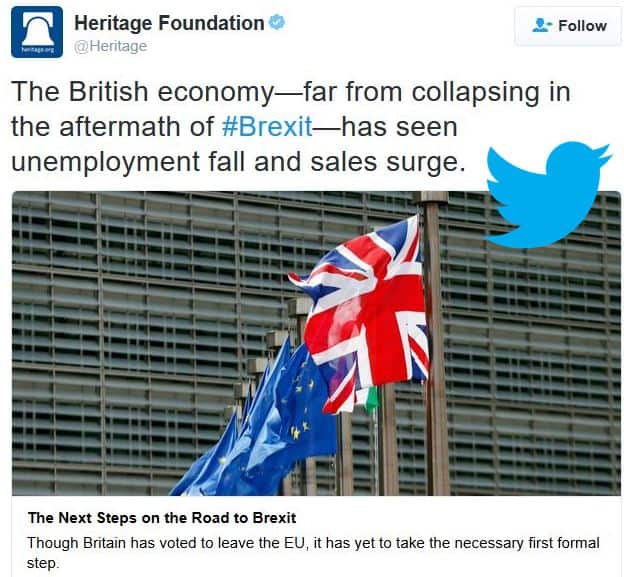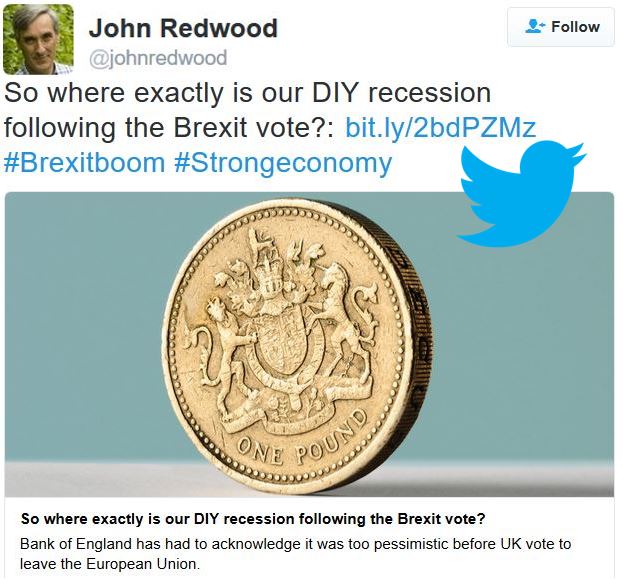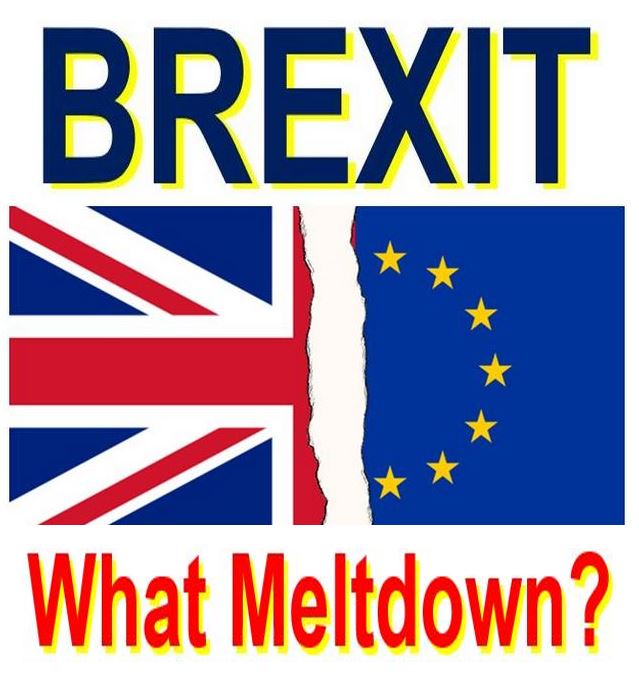Was the Brexit economic meltdown we were all warned about by Remain campaigners before the 23rd June referendum just a pack of scaremongering lies? Or did they simply have no idea what they were talking about? None of the dire predictions have occurred – in fact, the British economy has been thriving since the Brexit vote, according to a raft of data over the past few weeks coming out of the Office for National Statistics.
Some British newspapers are even talking about a post-Brexit economic boom.
Ever since we voted for Brexit – Britain Exiting the EU – we have experienced a roller-coaster of fear, panic, anxiety, relief, apprehension and hope. Within hours of announcing the referendum result, the pound sterling took a nosedive and stock markets in the UK plummeted, and then did the same in the rest of the EU and globally.
 A wave of optimism is spreading across the United Kingdom, with a growing number of people beginning to believe that there is a life after Brexit. (Image: twitter.com/Heritage)
A wave of optimism is spreading across the United Kingdom, with a growing number of people beginning to believe that there is a life after Brexit. (Image: twitter.com/Heritage)
The FTSE 100 has since fully recovered from those declines, which economists now admit were solely due to investor jitters.
Latest retail sales data were so strong that they reversed most of the immediate post-Brexit vote panic. According to retailers, the country had its strongest sales in six months. Earlier this week, industry data showed that the cheaper pound has been great for exporters.
In July 2016, consumer spending was 5.8% up compared to the same month last year – an encouragement to thousands of companies that had shelved investment plans since 23rd June.
Last week, official figures showed that unemployment, which is already less than half the Eurozone average, declined unexpectedly in the UK in July.
 John Redwood, a Conservative Party politician and Member of Parliament for Wokingham in the county of Berkshire, asks the gloom and doom forecasters what happened to their predictions. (Image: twitter.com/johnredwood)
John Redwood, a Conservative Party politician and Member of Parliament for Wokingham in the county of Berkshire, asks the gloom and doom forecasters what happened to their predictions. (Image: twitter.com/johnredwood)
Red-faced economists who had warned us of economic deterioration immediately after a Brexit vote have become surprisingly silent. Those with manageable egos today admit that the country’s post-referendum performance so far has surprised them.
There is a growing belief nationwide that Britain really will be able to avoid a recession that just a few weeks ago was a given.
Brexit outlook too early to tell
Experts today still warn – but this time their words are very different. They emphasize that with data for just July and August, it is too early to tell whether the country will avoid a recession and thrive. However, that is a very different warning compared to “If you vote Leave the country will fall apart!”
This early optimism, on the face of it, does contrast with former Prime Minister David Cameron’s warning that if we voted for Brexit it would be equivalent to putting a ‘bomb under the economy’.
Former Chancellor (finance minister) George Osborne repeated many times during his referendum campaign that a Brexit vote would immediately raise borrowing costs, which would devastate millions of people with monthly mortgage installments to pay. He said interest rate hikes would push our economy into a recession of our own making.
 We all waited anxiously for the predicted meltdown that would come after a Brexit vote. So far, it has all been good news. The economy is doing well. There is no meltdown.
We all waited anxiously for the predicted meltdown that would come after a Brexit vote. So far, it has all been good news. The economy is doing well. There is no meltdown.
However, on 4th August the Bank of England Monetary Policy Committee decided to do exactly the opposite – they slashed interest rates.
There are still many economists who say that these positive signals do not yet mean we should get out the champagne – because they have virtually no bearing on the country’s long-term economic outlook.
Britain faces years of uncertainty as our negotiating team tries find a way through the legal maze of separation.
Investors hate uncertainty, and they will not really start investing in a big way again until that uncertainty is gone. As soon as the Government invokes Article 50, thus starting the EU divorce proceedings, the whole process could take from two to up to ten years, experts say. What effect would up to a decade of economic uncertainty have on the British economy?
Invoking Article 50
Prime Minster Theresa May says she won’t invoke Article 50 until the first quarter of 2017. Most UK newspapers are predicting an earlier-than-expected triggering of Article 50 – a very basic five-point plan devised for any country that wishes to leave the EU.
The moment any EU member state invokes Article 50, divorce negotiations with the EU begin.
According to a Bloomberg report, Mrs. May is under intense and growing pressure from many of her MPs, her counterparts on the continent, and UKIP to trigger the Article soon.
Former UKIP leader, Nigel Farage, has warned the Prime Minister that if she is seen to be dragging her feet, he, UKIP and 51% of the country’s electorate (those who voted for Brexit) will apply growing pressure.
A team of government lawyers told Mrs. May this week that she does not need Parliamentary approval to trigger Article 50. She could use the royal prerogative to begin the separation process.
Video – Farage talks about the predictions
In an interview with Fox News, Nigel Farage describes all the scary predictions made by the Remain campaigners as a ‘complete pack of scaremongering lies’.
